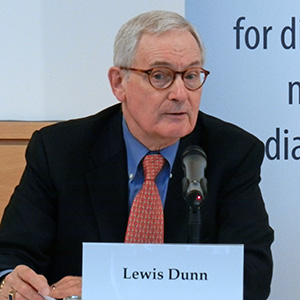
On 8 April 2016, the VCDNP hosted a seminar entitled "The Nuclear Non-Proliferation Treaty (NPT) Review Process: Looking Back to 2015, Looking Forward to 2020", featuring Dr. Lewis Dunn, Principal, Science Applications International Corporation (SAIC), and U.S. Ambassador to the 1985 NPT Review Conference. Dr. Dunn presented his personal views on lessons learned from the 2015 NPT Review Conference (RevCon) moving forward in the 2020 NPT review cycle.

According to Dr. Dunn, the review process is not working very well. The Preparatory Committees (PrepComs) do little to pave the way substantively for the Review Conference. There is a sense that the review process has not served us well. Too much time is spent at the RevCon on delivering national statements and packaged talking points. The polarization and divisions within the NPT community, especially between the nuclear-weapon States (NWSs), Arab States and non-nuclear-weapon States (NNWSs), are greater and more dramatic than they have been for over 30 years. States are talking past each other and there is difficulty in building bridges on nuclear disarmament pathways. The Humanitarian Initiative, for example, has significantly reframed the nuclear disarmament discourse and debate. The 130 plus States supporting the humanitarian pledge is indicative of the change in the nature of the nuclear disarmament debate, yet to date there still exists no agreement among members of the evolving initiative on what should be done next. Dr. Dunn opined that, although he did not agree with assertions that the risk of nuclear use was increasing, it was important that we reduce the risk of nuclear use. Dr. Dunn argued that the NWSs need to deliver a more convincing narrative on progress vis-à-vis nuclear disarmament during the 2020 review cycle.
Dr. Dunn also raised the Middle East issue, asking how and whether it appropriate to address the Middle East Nuclear Weapon Free Zone/Weapons of Mass Destruction Free Zone (NWFZ) matter within the NPT review process. The fate of the overall review process continues to be linked to this issue. While the US, the UK and Canada blocked consensus on the final document at the 2015 RevCon due to language on the Middle East, the Egyptian strategy and agenda did not assist in progressing forward. According to Dr. Dunn, given the many difficulties, it was not surprising that the proposed 2012 Helsinki conference on the establishment of a Middle East NWFZ did not occur when scheduled. That said, considering how intractable the issue is, Dr. Dunn praised how much progress Facilitator Laajava had made in pursuing agreement on an eventual conference.
Dr. Dunn suggested a number of ways for States to move forward on overall NPT issues during the upcoming 2020 NPT review process. States Parties need to look at the preparatory meetings afresh and assess how they can help improve the overall review process. Although NPT States Parties are not going to negotiate in earnest until the 2020 Review Conference, they could make better use of PrepCom Chairs' summaries. Ahead of the 2020 NPT RevCon, the creation of a rolling text of PrepCom Chairs' summaries could help move the work forward. In order to ensure a more effective and organized review process, NPT States Parties should ensure that officers are in place at least one year ahead of the scheduled meetings.

To reduce polarization in the review process, Dr. Dunn suggested revitalizing the nuclear disarmament process multilaterally and bilaterally. For example, Dr. Dunn suggested, other approaches are possible for negotiating a Fissile Material Cut-off Treaty (FMCT), circumventing the impasse on FMCT at the Conference on Disarmament (CD). Revitalizing the US-Russian arms control process and continuing the bilateral arms control process after 2021—when the New Strategic Arms Reduction Treaty needs to be extended, replaced or allowed to elapse—was key. Within the P5 process, the five NWSs need to provide their own vision on nuclear disarmament and carry forward voluntarily the reporting of their nuclear arsenals as they did in 2014. Dr. Dunn argued that it would be helpful for NNWSs to acknowledge that some progress had been made by the NWSs. Although the disarmament steps taken by NWSs to date are far from as ambitious as many NNWSs are demanding, Dr. Dunn argued that the steps that have been taken should be recognized by NNWSs as they were often bureaucratically tough measures to implement domestically. Dr. Dunn cautioned that dismissing the disarmament measures already taken may cause some NWSs to become reluctant to work on a consensus to do more.
As regards the Humanitarian Initiative—which will remain an important issue during the 2020 NPT review process—Dr. Dunn argued that it would be important for the NWSs to address concerns it had raised. Dr. Dunn suggested that a parallel approach by NWSs to address the risks of the use of nuclear weapons should be pursued in order to identify actions that they could take to reduce those risks. In this vein, Dr. Dunn suggested that NPT NWSs could make this a formal topic under the P5 process agenda.
The 2015 NPT Review Conference was a wake-up call for all States Parties to step back and reflect. The NPT remains an essential foundation for non-proliferation and disarmament and Dr. Dunn argued that States Parties could do a better job listening to each other. The 2020 Review Conference will be important, as it will mark 50 years after the NPT's entry into force and 75 years since the use of nuclear weapons in Hiroshima and Nagasaki. A credible, effective and robust NPT remains essential and desirable moving forward.
By continuing to use the site, you agree to the use of cookies. more information
The cookie settings on this website are set to "allow cookies" to give you the best browsing experience possible. If you continue to use this website without changing your cookie settings or you click "Accept" below then you are consenting to this.